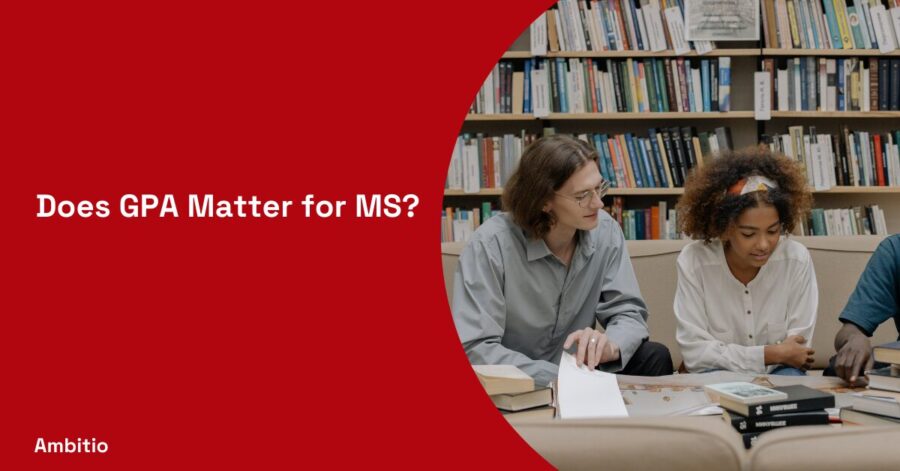11 December 2024
5 minutes read
Does GPA Matter for MS? Unraveling the Mysteries of Graduate School Admissions

Introduction
When embarking on the journey to graduate school, the question of whether GPA matters for MS admissions often looms large. This comprehensive guide explores the nuanced role of GPA in the context of MS admissions, juxtaposing it against other critical factors like GRE scores, statement of purpose, and overall academic profile.
For GPA centric Universities in the USA, check out this article: https://ambitio.club/blog/gpa-centric-universities-in-usa-for-ms/
The Integral Role of GPA in Graduate School Admissions
GPA: More Than Just a Number
GPA, a cumulative representation of one’s academic performance, serves as a crucial indicator in the admissions process. However, it’s important to understand that while a high GPA is desirable, graduate schools often seek candidates with a combination of academic excellence and other skills.
The Significance of Undergraduate Performance
Graduate programs view a high GPA as a testament to a student’s dedication and ability to handle rigorous academic work. A consistent GPA, particularly in core courses related to the intended field of study, showcases an applicant’s potential for success in graduate studies.
Yet, it’s essential to note that different institutions and programs have varying benchmarks for what constitutes an ‘ideal’ GPA.
The Impact of a Low Undergraduate GPA
A lower undergraduate GPA doesn’t automatically disqualify a candidate. Many graduate schools consider upward trends in GPA, improvement over time, and the rigor of the undergraduate program.
Applicants with a lower GPA can still present a strong case by highlighting other strengths in their application.
Balancing GPA and GRE Scores: A Delicate Dance
Graduate schools often weigh GPA against standardized test scores like the GRE. This comparison helps admissions committees evaluate applicants from diverse educational backgrounds on a common scale.
GRE Scores as a Counterbalance
For applicants with a less-than-stellar GPA, excelling in the GRE can provide a much-needed boost. A high GRE score can demonstrate an applicant’s readiness for graduate-level work, particularly in quantitative and verbal reasoning skills, which are crucial for success in many MS programs.
The Interplay of GPA and GRE in Admissions Decisions
Admissions committees typically look for a balance between GPA and GRE scores. A strong performance in one area can sometimes offset a weaker showing in the other.
However, it’s a misconception that a high GRE score can completely overshadow a low GPA. Most top-tier programs seek excellence in both areas.
The Weightage of GPA in Different Disciplines
The importance of GPA can vary significantly across different fields of study. For instance, technical programs might prioritize quantitative abilities, while humanities and social sciences may focus more on overall academic prowess.
| Discipline | GPA Importance | Key Considerations |
|---|---|---|
| STEM (Science, Technology, Engineering, Math) | High | Technical skills, Quantitative ability, Relevant coursework |
| Humanities (Literature, History, etc.) | Moderate to High | Critical thinking, Writing skills, Analytical ability |
| Social Sciences (Psychology, Sociology, etc.) | Moderate to High | Research skills, Analytical ability, Theoretical knowledge |
| Business and Management | High | Quantitative skills, Leadership potential, Practical experience |
| Fine Arts and Design | Moderate | Portfolio, Creativity, Practical skills |
| Health Sciences (Medicine, Nursing, etc.) | Very High | Clinical skills, Empathy, Academic rigor |
| Education | High | Teaching potential, Empathy, Academic performance |
The Global Perspective: GPA in International Contexts
For international students, the evaluation of GPA may differ. Different educational systems have varying grading scales, which admissions committees take into account.
Understanding GPA Conversions
International applicants must often convert their grades into the GPA system used in the U.S. Understanding these conversions is critical, as a misinterpretation can significantly impact the perceived academic performance of the student.
The Challenge for International Students
Apart from GPA conversions, international students must demonstrate their academic prowess in a context unfamiliar to admissions committees. This often means providing additional documentation, such as detailed transcripts or explanations of their grading system.
Beyond Academics: The Holistic Approach to Admissions
Graduate schools increasingly adopt a holistic approach to admissions, considering various aspects of an applicant’s profile beyond GPA and GRE scores.
The Role of Extracurricular Activities and Work Experience
Extracurricular activities, internships, and relevant work experience can significantly enhance an application. They demonstrate practical skills and a commitment to the field, which can be especially beneficial for applicants with a lower GPA.
Personal Statements and Letters of Recommendation
Personal statements and letters of recommendation provide context to the numbers in an application. They can offer insights into an applicant’s character, work ethic, and suitability for the program, potentially offsetting concerns about GPA.
Strategies for Applicants with Low GPA
Applying to graduate school with a low GPA can be challenging, but it’s not insurmountable. Here are some strategies that can help bolster your application:
- Excel in Standardized Tests: Achieving a high score on the GRE or other relevant standardized tests can offset a lower GPA. These scores demonstrate your current academic capabilities and readiness for graduate-level studies.
- Highlight Relevant Work Experience: If you have work experience relevant to your field of study, make sure to emphasize it. This can show the practical application of skills and dedication to the field, which is highly valued by admissions committees.
- Showcase Your Upward Academic Trend: If your GPA improved over time during your undergraduate studies, highlight this. It shows resilience and an increasing grasp of academic subjects, which can be appealing to admissions officers.
- Focus on Your Major GPA: If your major GPA is higher than your overall GPA, point this out. It demonstrates strength in your field of study, which is often more relevant to graduate school courses.
- Obtain Strong Letters of Recommendation: Letters of recommendation from professors or professionals who can vouch for your abilities and potential can significantly strengthen your application. They provide a third-party perspective on your capability to succeed in graduate studies.
- Write a Compelling Statement of Purpose (SOP): Your SOP is an opportunity to tell your story, explain any academic shortcomings, and articulate your passion and goals. A well-written SOP can make a strong impression on the admissions committee.
- Demonstrate Commitment Through Extracurriculars: Engaging in extracurricular activities related to your field can enhance your application. It shows commitment and can provide a more holistic view of your capabilities beyond academics.
- Undertake Additional Coursework or Certifications: Completing additional courses or certifications, especially in areas where your GPA was weak, can demonstrate your commitment to learning and improving your knowledge base.
- Address GPA Concerns Directly: If there are specific reasons for your low GPA (such as personal issues or health problems), consider addressing them briefly in your application. This transparency can provide context to your academic record.
- Apply to a Range of Schools: Broaden your range of target schools. Include programs where your profile aligns more closely with the average student profile, increasing your chances of acceptance.
- Leverage Research or Publications: If you have participated in research projects or have publications, especially in your field of study, highlight them. This can demonstrate your expertise and commitment to the field.
- Network with Faculty Members: Reach out to faculty members in programs you are interested in. Expressing your interest and discussing your academic and professional background can sometimes sway decisions, especially in smaller or more specialized programs.
By employing these strategies, applicants with a lower GPA can enhance their graduate school applications, demonstrating that they have much to offer beyond their undergraduate academic record.
Conclusion
In conclusion, while GPA is a crucial component in the MS admissions process, it’s not the sole determinant of success.
A comprehensive application that balances academic achievements with test scores, work experience, and a compelling personal narrative can significantly enhance your prospects in graduate school admissions.
FAQs
Q1: Can I get into a graduate program without taking the GRE?
Yes, some programs do not require the GRE. It’s essential to check the specific requirements of each program.
Q2: Is it possible to offset a low GPA with professional experience?
Professional experience can be a significant asset, especially if it’s relevant to the field of study. It can partially offset a lower GPA by demonstrating practical skills and commitment.
Q3: How important are extracurricular activities in graduate admissions?
Extracurricular activities can enhance an application, especially if they are relevant to the field of study or demonstrate leadership and teamwork skills.
Q4: Should I explain a low GPA in my application?
Yes, if there are extenuating circumstances that contributed to a lower GPA, it’s advisable to explain them in your SOP or additional essays.

You can study at top universities worldwide!
Get expert tips and tricks to get into top universities with a free expert session.
Book Your Free 30-Minute Session Now! Book a call now




























